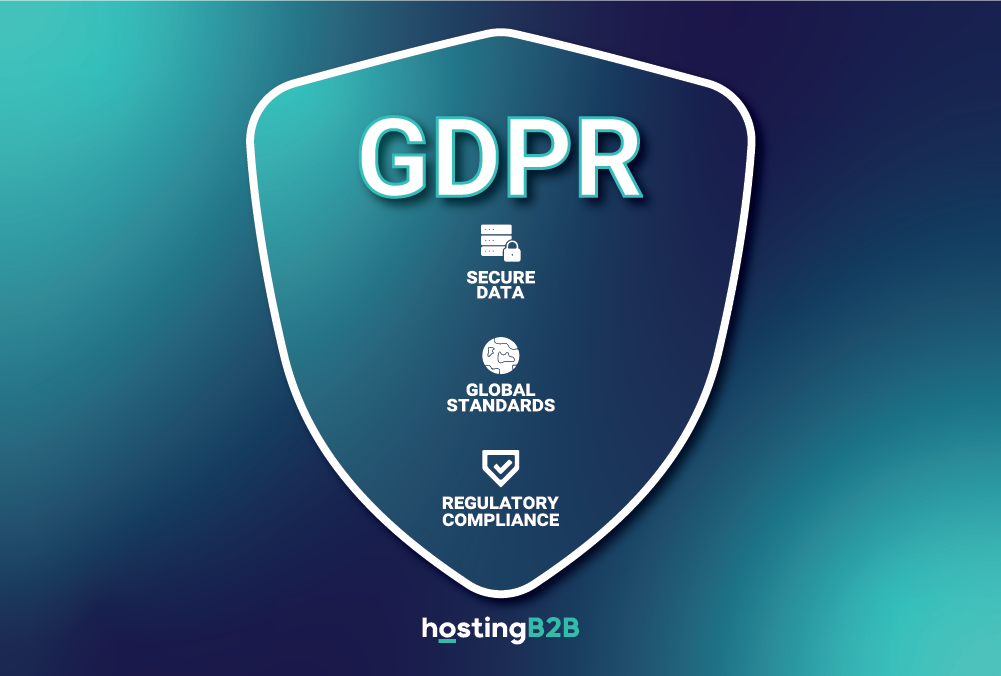


The General Data Protection Regulation (GDPR) is a pivotal law in the European Union (EU), reshaping the landscape of data privacy and protection. Enforced on May 25, 2018, GDPR has set new standards for handling personal data, requiring organizations to adhere to strict compliance requirements. For hosting providers like HostingB2B, understanding and implementing GDPR compliance is crucial, not only for legal reasons but also to maintain trust and integrity with clients.
What is GDPR?
GDPR is designed to protect the personal data of individuals within the EU. It applies to any organization that processes personal data, regardless of location, including those offering goods or services to EU residents or monitoring their behavior. This regulation enhances individuals’ rights over their data, imposes significant responsibilities on data controllers and processors, and introduces severe penalties for non-compliance.
Key Provisions of GDPR
Data Subject Rights
GDPR grants several rights to individuals, including the right to access their data, rectify inaccuracies, and request erasure (the “right to be forgotten”). Additionally, it includes the right to data portability. Therefore, hosting providers must ensure easy access and control over personal data for their clients.
Lawful Basis for Processing
There must be a lawful basis for processing personal data, such as consent from the data subject, compliance with legal obligations, or the performance of a contract. Other legitimate interests may apply, provided they do not override the data subject’s rights.
Data Protection by Design and by Default
GDPR requires that data protection measures are integrated into business processes from the start. This means that hosting providers should implement appropriate technical and organizational measures, including encryption, pseudonymization, and secure data storage.
Data Breach Notification
In the event of a data breach, the supervisory authority must be notified within 72 hours. Moreover, if the breach poses a high risk to individuals, the affected data subjects must also be informed promptly.
International Data Transfers
GDPR restricts the transfer of personal data outside the EU to ensure that the level of protection is maintained. Hosting providers must comply with GDPR’s requirements, such as using standard contractual clauses or ensuring that the receiving country has adequate data protection laws.
Impact on Hosting Providers
Enhanced Data Security
Under GDPR, hosting providers are required to implement robust security measures to protect personal data. This includes encrypting data, controlling access, and conducting regular security audits. These measures not only help in compliance but also build client trust.
Transparency and Accountability
Hosting providers must be transparent about how they collect, use, and store personal data. Maintaining records of processing activities is essential, as it demonstrates accountability and fosters trust with clients.
Increased Operational Costs
Compliance with GDPR can involve significant costs, including investments in new technologies, hiring data protection officers, and ensuring staff are adequately trained. Although these costs can be substantial, they are necessary to maintain compliance and avoid potential fines.
Global Reach
GDPR’s extraterritorial scope means that hosting providers outside the EU must also comply if they process the data of EU residents. Consequently, this has led to a global shift in data protection practices, with many companies adopting GDPR-like standards worldwide.
Opportunity for Differentiation
By emphasizing compliance, security, and privacy, hosting providers can differentiate themselves in a crowded market. In particular, GDPR compliance can serve as a significant selling point for clients who prioritize data protection.
Challenges and Best Practices
Regular Audits and Assessments
To ensure data protection measures are effective and up to date, regular audits and assessments should be conducted. This includes reviewing data processing activities and security measures frequently.
Training and Awareness
It is crucial to educate employees about GDPR and the importance of data protection. Ensuring that all staff understand their responsibilities under the regulation is key to maintaining compliance.
Engage Legal and Compliance Experts
Working with legal experts can help hosting providers understand the nuances of GDPR. This ensures that contracts, policies, and practices are compliant and up to date.
Invest in Technology
Investing in technologies that enhance data security is vital. Consider using GDPR-compliant data centers and cloud services to ensure the highest standards of data protection.
Conclusion
In summary, GDPR has significantly impacted hosting providers, mandating a heightened focus on data protection and privacy. By understanding the regulation and implementing best practices, hosting providers like HostingB2B can comply with the law while enhancing their reputation and trust with clients. This approach turns compliance into a strategic advantage, benefiting both the business and its clients.
The post GDPR Compliance for Hosting Providers appeared first on HostingB2B.








